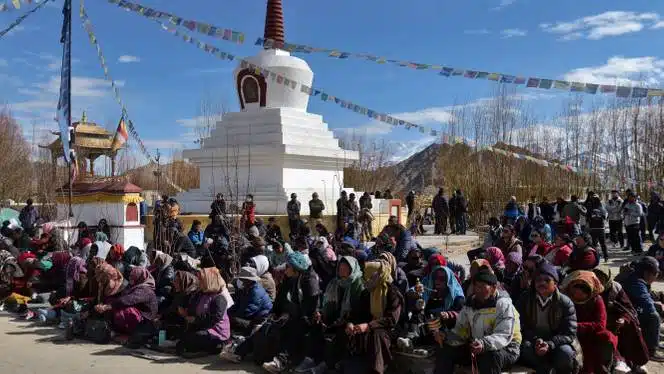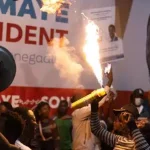After New Delhi deprived the disputed area of its statehood and semi-autonomy, Ladakh was divided from Indian-controlled Kashmir and has been negatively impacted by climate change.
In the bitter cold, thousands of people in the isolated Ladakh area have been staging protests for more than two weeks, calling on the Indian government to enact constitutional provisions that would safeguard the delicate ecology of their territory and grant them autonomy over land and agricultural decisions.
Ladakh, which is tucked away between China, Pakistan, and India, has experienced both environmental degradation and territorial conflicts. People’s lives in the thinly inhabited villages were impacted by droughts, landslides, and floods brought on by changing weather patterns.
Renowned climate campaigner Sonam Wangchuk is participating in the Leh protests. Since the protests began on March 6, he has been fasting outside in below-freezing temperatures, subsisting just on water and salt.
Wangchuk, another engineer at his Himalayan Institute of Alternative Ladakh, is developing sustainable solutions. He has dubbed his protest a “climate fast.”
Wangchuk told The Associated Press on Sunday that “we’re already facing climate disaster and these glaciers and mountains will be destroyed if there is not a check on unbridled industrial development and military maneuvers” in the area.
The thousands of glaciers that make Ladakh one of the world’s “water towers” are melting at an alarming rate, endangering millions of people’s access to water. The militarization of the area has led to a rise in local pollutants, which has made the melting worse. The deadly military confrontation between China and India since 2020 has made matters worse.
“The Matriarch of Democracy”
Additionally, he stated that Ladakh is in dire need of ecological preservation since the mountains are “part of the Greater Himalayas, intricately linked to over two billion people and multiple countries, so it’s not just a local disaster in (the) making.”
According to Wangchuk, the Ladakh nomads were also losing valuable pastureland to Chinese encroachment and massive Indian industrial projects. Shepherds in the area claim that Chinese military have taken control of many pasturelands and are preventing them from letting their cattle graze.
Later this month, the shepherds and Wangchuk intend to march to the Chinese border to highlight what they claim are Beijing’s ambitions to seize territory in Ladakh.
Ladakh separated from Indian-controlled Kashmir in August 2019 after New Delhi revoked the disputed area’s statehood and partial autonomy.
While a crackdown on dissent in every form and a plethora of new laws have effectively hushed restive Kashmir, demands for political rights in Ladakh have risen with calls for independence with the ability for local legislatures to create their own laws pertaining to land and agriculture. Without any success, the region’s delegates have met with powerful Indian Home Minister Amit Shah and other Indian officials on many occasions this month.
Wangchuk recently said on X, formerly Twitter, “This government likes to call India the ‘Mother of Democracy.” “But, India can only be referred to as the Stepmother of Democracy as far as Ladakh is concerned if it refuses to grant democratic rights to the people of Ladakh and keeps it governed by bureaucrats controlled from New Delhi.”
SOURCE: TRTWORLD






